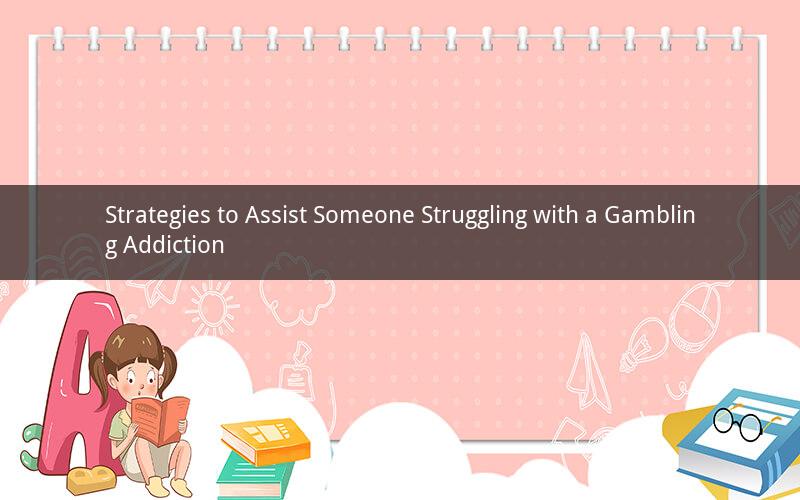
Introduction:
Gambling addiction, also known as compulsive gambling, is a serious issue that affects millions of individuals worldwide. When someone you care about is struggling with a gambling problem, it can be challenging to know how to help them. This article provides various strategies to assist someone with a gambling addiction, offering support and guidance for both the individual and their loved ones.
1. Educate Yourself:
Understanding the nature of gambling addiction is crucial in providing effective assistance. Learn about the signs, symptoms, and consequences of gambling addiction. Familiarize yourself with treatment options, support groups, and resources available to help the individual overcome their addiction.
2. Encourage Open Communication:
Create a safe and supportive environment for the individual to express their feelings and concerns. Encourage them to share their experiences with gambling and how it has impacted their life. Active listening and empathy can foster trust and open up the door for meaningful conversations.
3. Acknowledge the Problem:
Acknowledge that the individual has a gambling problem without judgment or criticism. It is essential to validate their feelings and experiences, as this can help them feel less isolated and more willing to seek help.
4. Support Them in Seeking Professional Help:
Encourage the individual to seek professional help from a therapist or counselor specializing in gambling addiction. Therapy can provide them with the tools and strategies to cope with their addiction, develop healthier habits, and address underlying issues contributing to their gambling behavior.
5. Encourage Participation in Support Groups:
Support groups, such as Gamblers Anonymous, can provide a sense of community and understanding for individuals struggling with gambling addiction. Encourage your loved one to attend these groups and connect with others who share similar experiences.
6. Financial Support and Management:
Assist the individual in managing their finances to prevent further gambling. This may involve helping them create a budget, monitoring their spending, and assisting with financial counseling if necessary. It is crucial to address the financial consequences of their addiction to prevent relapse.
7. Encourage Healthy Alternatives:
Encourage the individual to engage in activities that can serve as healthier alternatives to gambling. Suggest hobbies, exercise, socializing, and other interests that can provide fulfillment and distract them from the urge to gamble.
8. Be Patient and Understanding:
Recovery from a gambling addiction is a challenging and lengthy process. Be patient and understanding as the individual navigates through the ups and downs of their journey. Offer ongoing support and reassurance that you are there for them throughout their recovery.
9. Establish Boundaries:
Set clear boundaries to protect yourself from the consequences of your loved one's addiction. This may involve limiting contact with them during certain times, avoiding financial support, or seeking support for yourself if needed.
10. Take Care of Yourself:
It is crucial to prioritize your own well-being while supporting someone with a gambling addiction. Seek support for yourself, whether it be through therapy, support groups, or confiding in friends and family. Taking care of yourself ensures that you can continue to provide the necessary support for your loved one.
Questions and Answers:
1. Q: How can I approach someone I suspect has a gambling problem without causing offense?
A: Express your concerns in a non-accusatory and empathetic manner. Use "I" statements to convey your feelings and focus on your worries rather than placing blame. For example, say, "I'm worried about your gambling habits and how it's affecting you. I care about you and want to support you."
2. Q: Can I force someone to seek help for their gambling addiction?
A: While you cannot force someone to seek help, you can encourage and support them in doing so. Offer to assist them in finding resources, accompany them to appointments, or provide emotional support. Remember, the decision to seek help must come from the individual themselves.
3. Q: What if the individual refuses to seek help or acknowledges their problem?
A: It can be challenging when someone refuses to acknowledge their problem or seek help. Continue to express your concerns and offer support, but be prepared for resistance. In such cases, consider seeking support for yourself or involving a professional who may have more leverage in encouraging them to seek help.
4. Q: How can I help someone who has relapsed after seeking treatment for their gambling addiction?
A: Relapse is a common part of the recovery process. Encourage the individual to reflect on their relapse and learn from it. Support them in seeking help again, whether it be through therapy, support groups, or other resources. Be patient and understanding, as relapse does not mean the end of their recovery journey.
5. Q: How can I maintain my own mental health while supporting someone with a gambling addiction?
A: Taking care of yourself is crucial. Seek support from friends, family, or professionals who can provide guidance and assistance. Engage in self-care activities, such as exercise, hobbies, or therapy, to maintain your own mental and emotional well-being. Remember, you cannot help someone else if you are not taking care of yourself.